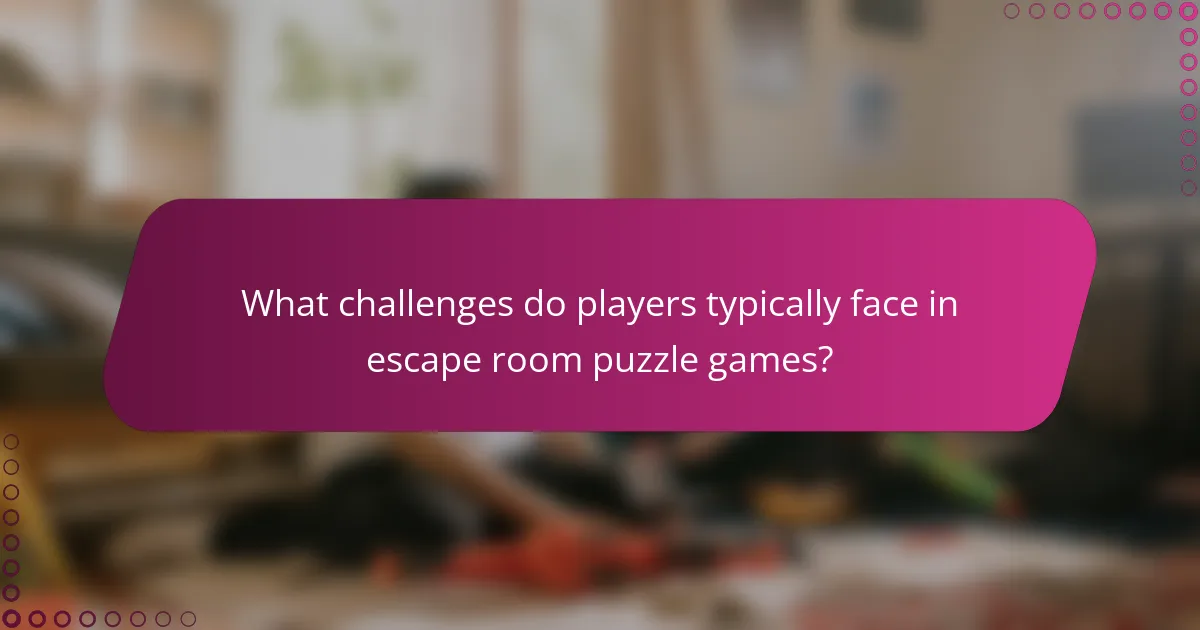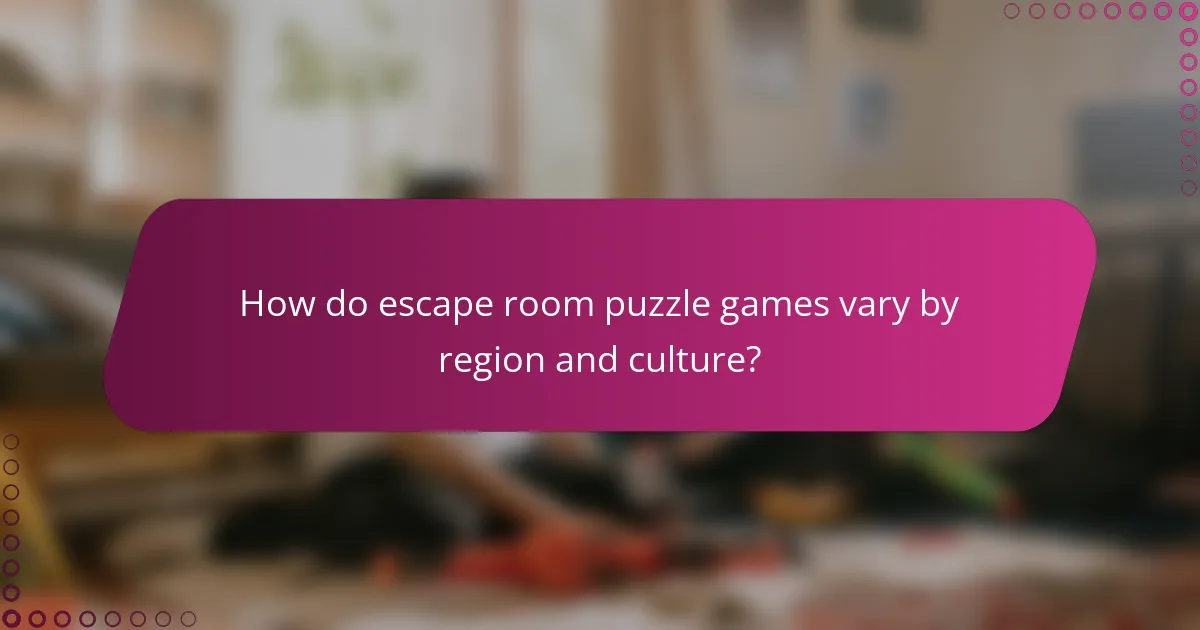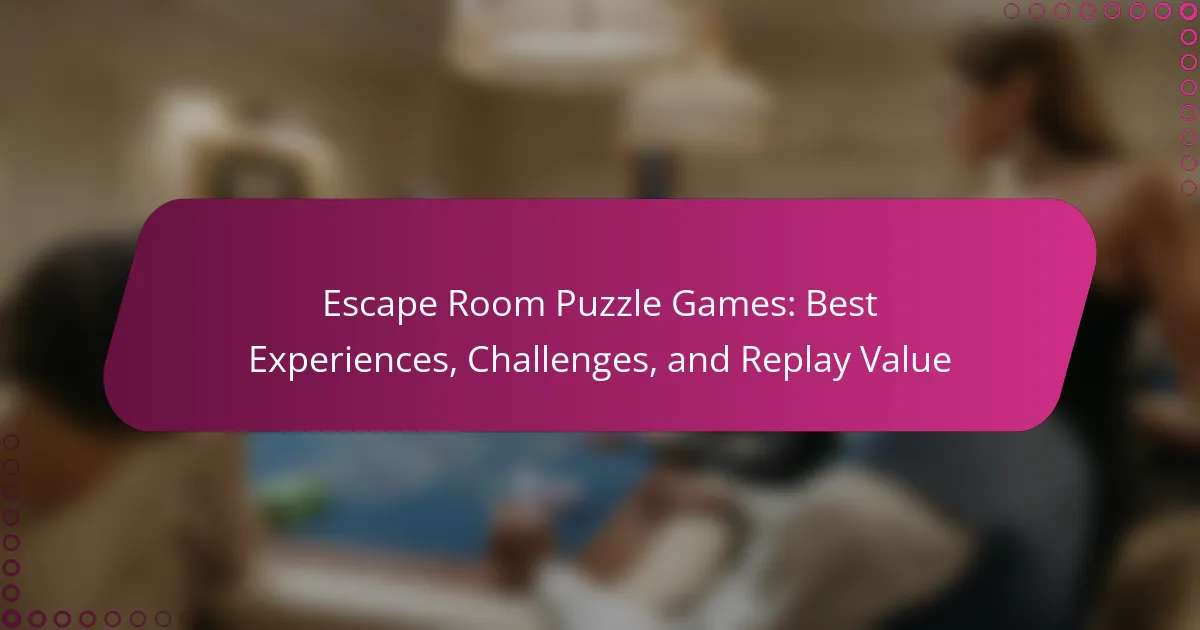Escape room puzzle games offer immersive experiences that challenge players and promote teamwork. This article explores the best experiences, common challenges faced, cultural variations, and factors contributing to their high replay value. Engaging puzzles and strong narratives keep players returning for new adventures, making these games a popular choice for social gatherings.

What makes escape room puzzle games a popular choice for entertainment?
Escape room puzzle games are popular due to their immersive experiences, engaging challenges, and high replay value. These games encourage teamwork and problem-solving, making them ideal for social gatherings. Unique themes and puzzles attract diverse audiences, while the thrill of timed challenges enhances excitement. As a result, participants often return for new adventures, ensuring lasting appeal.
How do escape room puzzle games enhance teamwork and communication skills?
Escape room puzzle games significantly enhance teamwork and communication skills. These games require players to collaborate, share ideas, and solve problems under time constraints.
Participants must communicate effectively to decipher clues and complete tasks. This fosters trust and encourages active listening among team members. As a result, players develop a deeper understanding of each other’s strengths and weaknesses.
Moreover, the immersive environment of escape rooms promotes engagement and camaraderie. Teams often reflect on their performance, discussing strategies and areas for improvement, which further strengthens their collaborative skills.
Overall, escape room experiences provide a unique platform for enhancing teamwork and communication in a fun and challenging setting.
What are the psychological benefits of participating in escape room experiences?
Participating in escape room experiences offers significant psychological benefits, including enhanced problem-solving skills and improved teamwork. These activities encourage critical thinking and foster communication among participants. Engaging in immersive challenges can also reduce stress and increase feelings of accomplishment. Overall, escape rooms provide a unique platform for personal growth and social interaction.

What challenges do players typically face in escape room puzzle games?
Players in escape room puzzle games often face challenges such as time constraints, complex puzzles, communication issues, and varying difficulty levels. Time limits create pressure, pushing players to think quickly. Complex puzzles can lead to frustration if solutions are not apparent. Poor communication among team members can hinder collaboration. Additionally, the difficulty levels of puzzles may not align with all players’ skills, impacting overall enjoyment.
How do time limits impact player performance and enjoyment?
Time limits enhance player performance and enjoyment by creating urgency and focus. Players often experience heightened adrenaline, which can lead to improved problem-solving skills and teamwork. The challenge of completing tasks within a set timeframe boosts engagement and satisfaction. Additionally, time constraints encourage replayability, as players strive to improve their previous performance. The unique attribute of time pressure in escape room puzzle games differentiates them from other gaming experiences, making each session distinct and memorable.
What types of puzzles are most commonly found in escape rooms?
Escape rooms typically feature a variety of puzzle types that challenge participants. Common puzzles include logic puzzles, physical challenges, riddles, and pattern recognition tasks. These puzzles often require teamwork and critical thinking to solve. Unique attributes like thematic storytelling and immersive environments enhance the overall experience, while rare attributes may include technology-driven puzzles such as augmented reality elements.
Which common pitfalls should players avoid to succeed?
Players should avoid common pitfalls like poor communication, lack of teamwork, and rushing through puzzles. Effective collaboration and strategic thinking enhance success in escape room puzzle games. Many players underestimate the importance of time management and clue utilization. Failing to observe surroundings can lead to missed opportunities and hinder progress.

How do escape room puzzle games vary by region and culture?
Escape room puzzle games vary significantly by region and culture, reflecting local themes and storytelling styles. For example, Asian escape rooms often incorporate mythology and folklore, while European rooms may focus on historical events. Cultural nuances influence puzzle design, difficulty levels, and narrative depth, enhancing the overall experience. Regional preferences for technology use, such as augmented reality, also shape gameplay. Additionally, the social dynamics of each culture affect how teams collaborate and communicate during challenges, creating unique atmospheres in each escape room.
What unique themes or storylines are popular in different areas?
Escape room puzzle games feature unique themes and storylines that vary by location. Popular themes include mystery, horror, adventure, and historical. For example, a mystery theme often involves solving a crime, while a horror theme may include escaping from a haunted location. Adventure themes frequently incorporate exploration, and historical themes transport players to significant past events. The replay value is enhanced by the diversity of these themes, offering players new experiences each time they participate.
How do local preferences influence puzzle design and difficulty?
Local preferences significantly shape escape room puzzle design and difficulty. Designers tailor puzzles to resonate with cultural references and interests of the target audience.
For instance, puzzles in urban areas may incorporate local landmarks or history, enhancing engagement. Conversely, rural settings might emphasize nature-related themes.
Difficulty levels often reflect local experience with puzzles; regions with a strong gaming culture may prefer more complex challenges. Additionally, feedback from local players helps refine puzzle mechanics and narratives, ensuring they align with community expectations.
Ultimately, understanding local preferences fosters a more immersive and enjoyable escape room experience, increasing replay value and customer satisfaction.

What factors contribute to the replay value of escape room puzzle games?
Replay value in escape room puzzle games stems from factors like varied puzzles, engaging narratives, and multiple outcomes. Diverse challenges keep players returning for new experiences. Unique game mechanics and evolving storylines enhance replayability. Additionally, group dynamics and teamwork influence enjoyment, encouraging repeated visits.
How does the design of puzzles affect player engagement over multiple visits?
The design of puzzles significantly enhances player engagement across multiple visits. Engaging puzzles create immersive experiences that encourage players to return.
Variety in puzzle types, such as logic, physical challenges, and teamwork-oriented tasks, caters to diverse preferences. Unique attributes, like narrative integration and thematic consistency, deepen emotional investment.
Replay value increases when puzzles evolve or include hidden elements that change with each visit. This dynamic keeps players intrigued and fosters a sense of discovery.
Additionally, well-designed puzzles promote collaboration, enhancing social interaction and making the experience more memorable. Engaged players are likely to recommend the escape room, boosting overall popularity.
What role do seasonal or limited-time escape room events play in replay value?
Seasonal or limited-time escape room events significantly enhance replay value by introducing unique themes and challenges. These events create a sense of urgency and exclusivity, encouraging players to return for new experiences. Unique attributes, such as themed puzzles and time-sensitive storylines, differentiate these events from regular offerings. As a result, players seek to experience both the novelty and the thrill of limited-time adventures, driving repeat visits and fostering community engagement.

What are the key attributes of a successful escape room experience?
A successful escape room experience features engaging puzzles, immersive themes, and strong teamwork dynamics. These attributes enhance participant enjoyment and challenge levels.
Engaging puzzles offer varying difficulty, catering to different skill levels. Immersive themes create a captivating atmosphere, drawing players into the narrative. Strong teamwork dynamics encourage collaboration, essential for solving complex challenges.
Replay value stems from diverse room designs and evolving puzzles, ensuring fresh experiences for repeat visitors. Unique storylines and innovative gameplay mechanics further enhance the overall appeal.
Ultimately, these key attributes work together to create memorable and enjoyable escape room experiences.
How important is the narrative in enhancing player immersion?
The narrative is crucial for enhancing player immersion in escape room puzzle games. A well-crafted story captivates players, making them feel part of the experience. Strong narratives provide context, deepen engagement, and encourage emotional investment. This connection elevates the overall challenge and replay value, as players are drawn back to explore different outcomes or storylines.
What technological innovations are shaping the future of escape rooms?
Technological innovations such as augmented reality, virtual reality, and artificial intelligence are revolutionizing escape rooms. These advancements enhance immersion, create dynamic puzzles, and improve player engagement. For instance, augmented reality overlays digital elements onto physical environments, making experiences more interactive. Virtual reality offers fully immersive settings, transporting players to different worlds. Artificial intelligence can adapt challenges in real-time based on player performance, increasing replay value. These technologies are shaping the future of escape room puzzle games significantly.
Which escape room games have achieved critical acclaim for their unique attributes?
Several escape room games have gained critical acclaim for their unique attributes, such as intricate storytelling, immersive environments, and innovative puzzles. Notable examples include “The Escape Game,” known for its high-quality production and engaging narratives, and “Escape Room: The Game,” which offers a variety of challenges and themes. “EXIT: The Game” stands out for its unique card-based mechanics and puzzle-solving approach. Each of these games enhances replay value through varied scenarios and difficulty levels, appealing to a wide range of players.
What expert tips can enhance your experience in escape room puzzle games?
To enhance your experience in escape room puzzle games, focus on teamwork, communication, and time management. Collaborate with your group to leverage diverse skills and perspectives. Effective communication helps in sharing clues and ideas promptly. Set time limits for solving each puzzle to maintain momentum and prevent frustration. Embrace creativity and think outside the box when approaching challenges. Additionally, familiarize yourself with common puzzle types to improve your problem-solving efficiency.




